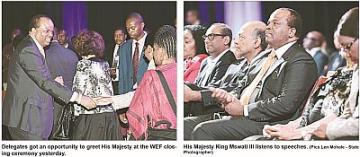LET’S GO, DO IT! – KING, LEADERS URGED

DURBAN, SOUTH AFRICA – ‘We know what needs to be done. Let us go and do it’.
This is the strong message sent out to Swaziland and other countries of the world that have been urged to pursue a path of accelerated economic growth that is sustainable and allows the people to not only share but own the economy.
The call was made by the Deputy President of South Africa Cyril Ramaphosa on the closing day of the World Economic Forum (WEF) yesterday.
Leaders have also been challenged to return next year with tangible results towards this objective.
Ramaphosa, who paid special recognition to the presence of His Majesty the King at the forum, said more attention needed to be focussed on action and deliverables.
inclusive
His Majesty had joined other regional leaders and delegates from a variety of sectors for a three day interaction on global economic issues under the theme; ‘Achieving inclusive growth through responsive and responsible leadership’.
In his closing remarks Ramaphosa challenged the delegates to demonstrate the gains that had been made in expanding economic opportunities for the people at the next meeting in 2018.
“We need to demonstrate how the economic status of women has improved; how we have expanded youth employment and skills development.
“We need to demonstrate how our governments are managing public finances and allocating resources more effectively to support inclusive growth. We need to demonstrate the measures we have taken to reduce wastage, corruption and mismanagement. Most importantly, we need to demonstrate how we are massively expanding the provision of early childhood development, education, skills and training,” he said.
Ramaphosa said to achieve progress in these areas, bold and responsible leadership was required. He said governments needed to give leadership, but so too did the private sector, civil society and labour.
collective
He said countries needed leadership that puts the needs of citizens first.
“We need a leadership than can build social partnerships for collective action in removing the barriers to economic inclusion.
“As we leave Durban, let us leave understanding the urgency of our task. Let us leave understanding that our actions now will determine the fate of our continent for many generations to come. We need to work harder, more collaboratively and with focus if we are to ensure that the millions of our peoples who are today marginalised have access to economic opportunity,” said the deputy President.
Ramaphosa said the meeting underscored the broad consensus among policy makers, business people, development practitioners, activists and communities about what needed to be done.
He said from the discussions that had taken place, there is an understanding of the urgency with which we needed to address exclusion, inequality and unemployment.
“Underpinning all of these discussions is a fundamental imperative. It is this fundamental imperative that is the critical guarantor of sustained and sustainable inclusive growth on the African continent. It is this fundamental imperative that will transform Africa from a continent of promise into a continent of prosperity,” he said.
Ramaphosa said this fundamental imperative which must inform every policy and every action was the development of the mind of the African child, for it was in the mind of the African child that the future of this continent resided.
intellectual
“It is only by developing the intellectual capacity of the African workforce of tomorrow that we will be able to effectively exploit our abundant resources for the benefit of our people – and seize the opportunities of the fourth industrial revolution. The development of Africa’s children and its youth needs to be at the centre of our economic policies,” he said.
To achieve this, he advised, countries must give just as much attention to maternal health as they do to the expansion of free trade areas.
development
“It means that we must invest as much in early child development as we do in energy and communications infrastructure.
“It means we must act with urgency to end AIDS, TB, malaria and other diseases of poverty not only so that we may save lives, but also so that the people of this continent may prosper. In the main, we need a comprehensive overhaul of our approach to education,” he said.




 del.icio.us
del.icio.us Digg
Digg
Comments (0 posted):